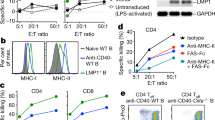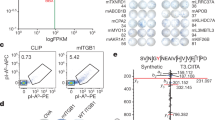Abstract
Major histocompatibility complex (MHC) class I molecules can function as specific target antigens in T-cell-mediated cytotoxity 1,2. In addition, T cells can kill target cells through non-MHC antigens, for example, virally infected cells, if the target and effector cells express the same MHC class I antigens2. Consequently, quantitative and/or qualitative variations in the expression of the H–2/HLA antigens on the target cells could interfere with MHC-restricted immune reactions. We have reported that the AKR leukaemia cell line K36.16, a subline of K36 (ref. 3), on which the H–2Kk antigen cannot be detected, is resistant to T-cell lysis and grows very easily in AKR mice4. Other AKR tumour cell lines, like 369, which have a relatively large amount of H–2Kk on their surface, are easily killed by T cells in vitro and require a much larger inoculum to grow in vivo4. Monoclonal antibodies against H–2Kk, but not against H–2Dk, prevented the killing by T cells4,5. This suggests that some tumour cells grow in vivo because tumour-associated antigen(s) cannot be recognized efficiently by the host's immune system, due to the absence of MHC molecules which would function as restriction elements for T-cell cytotoxicity. We have tested this hypothesis by introducing the H-2Kk gene into the H–2Kk-deficient AKR tumour cell line K36.16 and have now demonstrated directly the biological relevance of H–2Kk antigen expression in the regulation of the in vivo growth of this tumour cell line.
This is a preview of subscription content, access via your institution
Access options
Subscribe to this journal
Receive 51 print issues and online access
$199.00 per year
only $3.90 per issue
Buy this article
- Purchase on Springer Link
- Instant access to full article PDF
Prices may be subject to local taxes which are calculated during checkout
Similar content being viewed by others
References
Schreffler, D. C. & David, C. S. Adv. Immun. 20, 125–195 (1975).
Zinkernagel, R. M. & Doherty, P. D. Adv. Immun. 27, 52–177 (1979).
Old, E. J., Boyse, E. A. & Stockert, E. Cancer Res. 25, 813–819 (1965).
Festenstein, H. & Schmidt, W. Immun. Rev. 60, 85–127 (1981).
Schmidt, W. & Festenstein, H. Immunogenetics 16, 257–264 (1982).
Grosveld, F. G. et al. Nucleic Acids Res. 10, 6715–6732 (1982).
Horbita, K. & Harris, A. W. Expl Cell Res. 60, 61–70 (1970).
Baldani, P., Pogo, F., Gisselbrecht, S. & Komilsky, P. J. exp. Med. 158, 1294–1306 (1983).
Eisenbach, L., Segal, S. & Feldman, M. Int. J. Cancer 32, 113–120 (1983).
Gooding, L. R. J. Immun. 129, 1306–1312 (1982).
Rogers, M. J., Gooding, L. R., Margulies, D. H. & Evans, G. A. J. Immun. 130, 2418–2422 (1983).
Schrier, P. I., Bernards, R., Vaessen, R. T. M. J., Houweling, A. & van der Eb, A. J. Nature 305, 771–775 (1983).
Bernards, R. et al. Nature 305, 776–779 (1983).
Pierotti, M. A., Ballinaii, D., Colombo, M. P., Gragioli, L. & Parmiani, G. Transplantn Proc. 15, 2068–2073 (1983).
Oi, V., Jones, P. P., Goding, J. W. & Herzenberg, L. A. Curr. Topics Microbiol. Immun. 81, 115–129 (1978).
Ozata, K., Mayer, N. & Sachs, D. H. J. Immun. 124, 533–540 (1980).
Kohler, G., Fischer Lindahl, K. & Hensser, C. Immune System 2, 202–208 (1981).
Berk, A. J. & Sharp, P. A. Cell 12, 721–732 (1977).
Weaver, R. F. & Weissmann, C. Nucleic Acids Res. 7, 1175–1193 (1979).
Wigler, M. et al. Cell 16, 777–785 (1979).
Author information
Authors and Affiliations
Rights and permissions
About this article
Cite this article
Hui, K., Grosveld, F. & Festenstein, H. Rejection of transplantable AKR leukaemia cells following MHC DNA-mediated cell transformation. Nature 311, 750–752 (1984). https://doi.org/10.1038/311750a0
Received:
Accepted:
Issue Date:
DOI: https://doi.org/10.1038/311750a0
This article is cited by
-
Biomarkers in individualized management of chimeric antigen receptor T cell therapy
Biomarker Research (2020)
-
Adequate Antigen Availability: A Key Issue for Novel Approaches to Tumor Vaccination and Tumor Immunotherapy
Journal of Neuroimmune Pharmacology (2013)
-
Optimal MHC-II-restricted tumor antigen presentation to CD4+ T helper cells: the key issue for development of anti-tumor vaccines
Journal of Translational Medicine (2012)
-
AAV2-mediated in vivo immune gene therapy of solid tumours
Genetic Vaccines and Therapy (2010)
-
Immunotherapy success in prophylaxis cannot predict therapy: prime-boost vaccination against the 5T4 oncofoetal antigen
Cancer Immunology, Immunotherapy (2007)
Comments
By submitting a comment you agree to abide by our Terms and Community Guidelines. If you find something abusive or that does not comply with our terms or guidelines please flag it as inappropriate.



